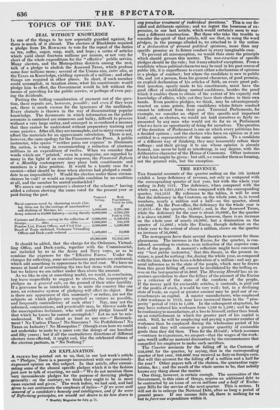THE REVENUE.
THE financial accounts of the quarter ending on the 5th instant exhibit a large deficiency of revenue, not only as compared with the corresponding quarter of last year, but with the whole year ending in July 1831. The deficiency, when compared with the whole year, is 2,661,8481.; when compared with the corresponding quarter, 344,565/. By reference to the tables, it will be seen that the deficiency in the Customs, on the whole year, is, in round numbers, nearly a million and a half—on the • quarter, about 240,000/. In the Post-office, the deficiency for the whole year is 57,0171.—for the quarter, 54,006/.; and, in the Assessed Taxes, while the deficiency for the year is about 30,0001., for the quarter it is above 80,000/. In the Stamps, however, there is an increase on the whole year of nearly 50,0001., but a diminution on the quarter of 15,000/.; while the Excise, though deficient on the whole year to the extent of about a million, shows on the quarter an increase of 56,0001.
The newspapers have their several theories to account for these
phenomena. The increase in the Excise, for the quarter, is con- sidered, according to custom, as an indication of the superior com- forts of the people. A moment's reflection might have convinced any "best public instructor," that this theory, in the present in- stance, is good for nothing ; for, during the whole year, as compared with the last, there has been a defalcation of a million : and any ge- neral inference as to the state of the people, which may be drawn from this great falling off, cannot be invalidated by the trifling ex cess on the last quarter of 56,000/. The Morning Herald has an in- genious speculation to show the fallacy of the amount of the Excise as a criterion of the state of the comforts of the people. If the money paid for exciseable articles, it contends, is paid out of the profits of stock, it would be very well; but, in a declining state of trade, an equal or greater amount may be paid out of en- croachments on capital. A master manufacturer, who employed 1,000 workmen in 1823, may have increased them in the " pros- perity " period of 1825 to 1,500. In the subsequent stagnation, he may have reduced his workmen from 1,500 to 1,200; and he may be continuing to manufacture, at a loss to himself, rather than break up an establishment in which the greater part of his capital is sunk: Still, he will be employing and paying a greater number of workmen than lie employed during the wholesome period of his trade ; and they will consume a greater quantity of exciseable goods than they did then. Thus far the Herald; which assumes —contrary to experience, we suspect—that the wages of the work- man would suffer no material diminution by the circumstances that compelled his employer to make such sacrifices. The Courier accounts for the falling off in the Customs of
240,000/. for the quarter, by saying, that in the corresponding quarter of last year, 300,000/. was received as duty on foreign corn. But will this account for the falling off of a million and a half for the year? Other papers talk of the cholera, the quarantine regu- lations, &e.; and the result Of the whole seems to be, that nobody knows any thing about the matter. One thing, however, is certain enough. The necessities of the
Government, in this state of things, require an additional debt to be contracted by an issue of seven millions and a half of Exche- quer Bills for the Service of the next quarter. This is serious. It will not do to enlarge the National Debt, after so long a period of general peace. If our income falls off, there is nothing for us but to farce our expenditure within it.


























 Previous page
Previous page